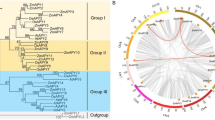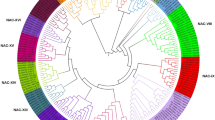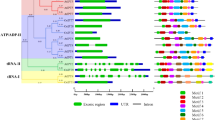Abstract
The plant homeodomain (PHD)-finger proteins are universally found in eukaryotes. In animals, the structure and function of PHD-finger proteins have been well studied. The PHD family is one of the important transcription factor (TF) families that have crucial roles in different biological processes in plants. In this study, 106 putative TFs were identified from carrot based on the carrot genomic and transcriptomic sequences. According to the phylogenetic comparisons in Arabidopsis and Populus trichocarpa, the PHD proteins were distinguished into 11 groups (A–J, L). The amino acid sequence, phylogenetic tree, physical characterizations, and conserved motifs of the PHD family TFs were predicted and analyzed. The analysis on the PHD family TFs in different species revealed that the number of PHD TFs in different species had a close relationship with the evolution of plant. The expression profiles of the four selected DcPHD genes were detected in leaf, root, and stem of carrot. Gene expression appeared to be tissue-specific in carrot. To analyze the response of DcPHD genes to abiotic stress, the expression profiles of the four DcPHD genes that were selected from the subgroup I were also detected through quantitative real time-PCR under abiotic stress treatments. In carrot, the expression levels of some genes were up-regulated, whereas the others were down-regulated, such as DcPHD-I-15 under heat stress treatment at 1 h. Results show that different DcPHD genes had different relative expression levels in the same condition. In this study, we mainly introduced the progress in the research on the structure and function of PHD TFs in carrot. This study may offer rich information for in depth research on PHD factors, as well as becoming a useful reference for PHD evolutionary relationship in plants. Results provide novel insights into the stress responses of DcPHD genes and promote a better understanding of the construction and function of this gene in carrot.








Similar content being viewed by others
References
AbuQamar S, Luo H, Laluk K, Mickelbart MV, Mengiste T (2009) Crosstalk between biotic and abiotic stress responses in tomato is mediated by the AIM1 transcription factor. Plant J 58:347–360. doi:10.1111/j.1365-313X.2008.03783.x
Andrea F et al (2013) STRING v9.1: protein–protein interaction networks, with increased coverage and integration. Nucleic Acids Res 41:D808–D815
Bailey TL et al (2009) MEME Suite: tools for motif discovery and searching. Nucleic Acids Res 37:W202–W208. doi:10.1093/nar/gkp335
Bienz M (2006) The PHD finger, a nuclear protein-interaction domain. Trends Biochem Sci 31:35–40. doi:10.1016/j.tibs.2005.11.001
Breen TR, Chinwalla V, Harte PJ (1995) Trithorax is required to maintain engrailed expression in a subset of engrailed-expressing cells. Mech Dev 52:89–98
Capili A, Schultz D, Rauscheriii F, Borden K (2001) Solution structure of the PHD domain from the KAP-1 corepressor: structural determinants for PHD, RING and LIM zinc-binding domains. Embo J 20:165–177
Cattivelli L et al (2008) Drought tolerance improvement in crop plants: an integrated view from breeding to genomics. Field Crops Res 105:1–14. doi:10.1016/j.fcr.2007.07.004
Chen WJ, Zhu T (2004) Networks of transcription factors with roles in environmental stress response. Trends Plant Sci 9:591–596. doi:10.1016/j.tplants.2004.10.007
Conant GC, Birchler JA, Pires JC (2014) Dosage, duplication, and diploidization: clarifying the interplay of multiple models for duplicate gene evolution over time. Curr Opin Plant Biol 19:91–98
Dong J, Gao Z, Liu S, Li G, Yang Z, Huang H, Xu L (2013) SLIDE, the protein interacting domain of ISWI remodelers, binds DDT-domain proteins of different subfamilies in chromatin remodeling complexes. J Integr Plant Biol 55:928–937
Eulgem T, Rushton PJ, Robatzek S, Somssich IE (2000) The WRKY superfamily of plant transcription factors. Trends Plant Sci 5:199–206
Gasteiger E, Gattiker A, Hoogland C, Ivanyi I, Appel RD, Bairoch A (2003) ExPASy: the proteomics server for in-depth protein knowledge and analysis. Nucleic Acids Res 31:3784–3788
Huang Y et al (2014) Heat shock factors in carrot: genome-wide identification, classification, and expression profiles response to abiotic stress. Mol Biol Rep. doi:10.1007/s11033-014-3826-x
Iorizzo M et al (2011) De novo assembly and characterization of the carrot transcriptome reveals novel genes, new markers, and genetic diversity. BMC Genom 12:389
Ito T, Shinozaki K (2002) The MALE STERILITY1 gene of Arabidopsis, encoding a nuclear protein with a PHD-finger motif, is expressed in tapetal cells and is required for pollen maturation. Plant Cell Physiol 43:1285–1292
Ito Y, Chujo A, Eiguchi M, Kurata N (2004) Radial axis differentiation in a globular embryo is marked by HAZ1, a PHD-finger homeobox gene of rice. Gene 331:9–15. doi:10.1016/j.gene.2004.02.040
Ito T, Nagata N, Yoshiba Y, Ohme-Takagi M, Ma H, Shinozaki K (2007) Arabidopsis MALE STERILITY1 encodes a PHD-type transcription factor and regulates pollen and tapetum development. Plant Cell 19:3549–3562. doi:10.1105/tpc.107.054536
Jabbar S et al (2014) Quality of carrot juice as influenced by blanching and sonication treatments. LWT Food Sci Technol 55:16–21. doi:10.1016/j.lwt.2013.09.007
Just BJ, Santos CAF, Fonseca MEN, Boiteux LS, Oloizia BB, Simon PW (2007) Carotenoid biosynthesis structural genes in carrot (Daucus carota): isolation, sequence-characterization, single nucleotide polymorphism (SNP) markers and genome mapping. Theor Appl Genet 114:693–704. doi:10.1007/s00122-006-0469-x
Kosová K, Prášil IT, Vítámvás P (2008) The relationship between vernalization-and photoperiodically-regulated genes and the development of frost tolerance in wheat and barley. Biol Plant 52:601–615. doi:10.1007/s10535-008-0120-6
Kosová K, Vítámvás P, Prášil IT (2014) Proteomics of stress responses in wheat and barley—search for potential protein markers of stress tolerance. Front Plant Sci 5:711. doi:10.3389/fpls.2014.00711
Livak KJ, Schmittgen TD (2001) Analysis of relative gene expression data using real-time quantitative PCR and the 2−ΔΔCT method. Methods 25:402–408. doi:10.1006/meth.2001.1262
Loewith R, Meijer M, Lees-Miller SP, Riabowol K, Young D (2000) Three yeast proteins related to the human candidate tumor suppressor p33(ING1) are associated with histone acetyltransferase activities. Mol Cell Biol 20:3807–3816
Ma T, Tian C, Luo J, Zhou R, Sun X, Ma J (2013) Influence of technical processing units on polyphenols and antioxidant capacity of carrot (Daucus carrot L.) juice. Food Chem 141:1637–1644. doi:10.1016/j.foodchem.2013.04.121
Ma J, Wang F, Li M-Y, Jiang Q, Tan G-F, Xiong A-S (2014) Genome wide analysis of the NAC transcription factor family in Chinese cabbage to elucidate responses to temperature stress. Sci Hortic 165:82–90. doi:10.1016/j.scienta.2013.11.005
Ma J, Li M-Y, Wang F, Tang J, Xiong A-S (2015) Genome-wide analysis of Dof family transcription factors and their responses to abiotic stresses in Chinese cabbage. BMC Genom 16:33. doi:10.1186/s12864-015-1242-9
Machanick P, Bailey TL (2011) MEME-ChIP: motif analysis of large DNA datasets. Bioinformatics 27:1696–1697
Mansisidor AR et al (2011) A conserved PHD finger protein and endogenous RNAi modulate insulin signaling in Caenorhabditis elegans. PLoS Genet 7:e1002299. doi:10.1371/journal.pgen.1002299
Mengiste T, Chen X, Salmeron J, Dietrich R (2003) The BOTRYTIS SUSCEPTIBLE1 gene encodes an R2R3MYB transcription factor protein that is required for biotic and abiotic stress responses in Arabidopsis. Plant Cell 15:2551–2565. doi:10.1105/tpc.014167
Moore RC, Purugganan MD (2005) The evolutionary dynamics of plant duplicate genes. Curr Opin Plant Biol 8:122–128
Mortazavi A, Williams BA, McCue K, Schaeffer L, Wold B (2008) Mapping and quantifying mammalian transcriptomes by RNA-Seq. Nat Methods 5:621–628
Munns R (2005) Genes and salt tolerance: bringing them together. New Phytol 167:645–663. doi:10.1111/j.1469-8137.2005.01487.x
Munns R, Tester M (2008) Mechanisms of salinity tolerance. Annu Rev Plant Biol 59:651–681. doi:10.1146/annurev.arplant.59.032607.092911
Nada L, Pierre L, McEwen AG, Santiago RM, Jean-Pierre S, Catherine B (2011) The PHD finger of human UHRF1 reveals a new subgroup of unmethylated histone H3 tail readers. Plos One 6(11):e27599. doi:10.1371/journal.pone.0027599
Niimi A, Hopkins SR, Downs JA, Masutani C (2015) The BAH domain of BAF180 is required for PCNA ubiquitination. Mutat Res Fundam Mol Mech Mutagen 779:16–23
Org T et al (2008) The autoimmune regulator PHD finger binds to non-methylated histone H3K4 to activate gene expression. EMBO Rep 9:370–376. doi:10.1038/embor.2008.11
Parker DS, Jemison J, Cadigan KM (2002) Pygopus, a nuclear PHD-finger protein required for Wingless signaling in Drosophila. Development 129:2565–2576
Pascual J, Martinez-Yamout M, Dyson HJ, Wright PE (2000) Structure of the PHD zinc finger from human Williams-Beuren syndrome transcription factor. J Mol Biol 304:723–729. doi:10.1006/jmbi.2000.4308
Pérez-Rodríguez P, Riaño-Pachón DM, Corrêa LGG, Rensing SA, Kersten B, Mueller-Roeber B (2010) PlnTFDB: updated content and new features of the plant transcription factor database. Nucleic Acids Res 38:D822–D827. doi:10.1093/nar/gkp805
Pfaffl MW (2001) A new mathematical model for relative quantification in real-time RT–PCR. Nucleic Acids Res 29:e45
Rensing SA (2014) Gene duplication as a driver of plant morphogenetic evolution. Curr Opin Plant Biol 17C:43–48
Riechmann JL et al (2000) Arabidopsis transcription factors: genome-wide comparative analysis among eukaryotes. Science 290:2105–2110
Rong J et al (2014) New insights into domestication of carrot from root transcriptome analyses. BMC Genom 15:895. doi:10.1186/1471-2164-15-895
Ryo Y et al (2006) A novel mitochondrial ubiquitin ligase plays a critical role in mitochondrial dynamics. Embo J 25:3618–3626
Schindler U, Beckmann H, Cashmore AR (1993) HAT3.1, a novel Arabidopsis homeodomain protein containing a conserved cysteine-rich region. Plant J 4:137–150. doi:10.1046/j.1365-313X.1993.04010137.x
Scott HS et al (1998) Common Mutations in autoimmune polyendocrinopathy-candidiasis-ectodermal dystrophy patients of different origins. Mol Endocrinol 12:1112–1119. doi:10.1210/mend.12.8.0143
Seo Y, Park J, Kim YS, Park Y, Kim YH (2014) Screening and histopathological characterization of Korean carrot lines for resistance to the root-knot nematode meloidogyne incognita. Plant Pathol J 30:75–81. doi:10.5423/PPJ.OA.08.2013.0082
Shindo H, Suzuki R, Tsuchiya W, Taichi M, Nishiuchi Y, Yamazaki T (2012) PHD finger of the SUMO ligase Siz/PIAS family in rice reveals specific binding for methylated histone H3 at lysine 4 and arginine 2. FEBS Lett 586:1783–1789. doi:10.1016/j.febslet.2012.04.063
Soltis PS, Soltis DE (2004) The origin and diversification of angiosperms. Am J Bot 91:1614–1626
Suzuki N, Rizhsky L, Liang H, Shuman J, Shulaev V, Mittler R (2005) Enhanced tolerance to environmental stress in transgenic plants expressing the transcriptional coactivator multiprotein bridging factor 1c. Plant Physiol 139:1313–1322. doi:10.1104/pp.105.070110
Tamura K, Peterson D, Peterson N, Stecher G, Nei M, Kumar S (2011) MEGA5: molecular evolutionary genetics analysis using maximum likelihood, evolutionary distance, and maximum parsimony methods. Mol Biol Evol 28:2731–2739. doi:10.1093/molbev/msr121
Tang J, Wang F, Wang Z, Huang Z, Xiong A, Hou X (2013) Characterization and co-expression analysis of WRKY orthologs involved in responses to multiple abiotic stresses in Pak-choi (Brassica campestris ssp. chinensis). BMC Plant Biol 13:188
Tian C, Jiang Q, Wang F, Wang G-L, Xu Z-S, Xiong A-S (2015) Selection of suitable reference genes for qPCR normalization under abiotic stresses and hormone stimuli in carrot leaves. PLoS One 10:e0117569. doi:10.1371/journal.pone.0117569
Trappe R, Ahmed M, Gläser B, Vogel C, Tascou S, Burfeind P, Engel W (2002) Identification and characterization of a novel murine multigene family containing a PHD-finger-like motif. Biochem Biophys Res Commun 293:816–826. doi:10.1016/S0006-291X(02)00277-2
Tsuchiya T, Eulgem T (2014) The PHD-finger module of the Arabidopsis thaliana defense regulator EDM2 can recognize triply modified histone H3 peptides. Plant Signal Behav 9:e29202. doi:10.4161/psb.29202
Wang W, Vinocur B, Altman A (2003) Plant responses to drought, salinity and extreme temperatures: towards genetic engineering for stress tolerance. Planta 218:1–14. doi:10.1007/s00425-003-1105-5
Wei W et al (2009) Soybean GmPHD-type transcription regulators improve stress tolerance in transgenic Arabidopsis plants. Plos One 4:e7209
Wei W et al (2015) The Alfin-like homeodomain finger protein AL5 suppresses multiple negative factors to confer abiotic stress tolerance in Arabidopsis. Plant J 81:871–883. doi:10.1111/tpj.12773
Wu S, Wu M, Dong Q, Jiang H (2015) Genome-wide identification, classification and expression analysis of the PHD-finger protein family in Populus trichocarpa. Gene S0378–1119:01012–01014
Xiong AS et al (2008) Gene duplication and transfer events in plant mitochondria genome. Biochem Biophys Res Commun 376:1–4
Xiong AS et al (2009) Gene duplication, transfer, and evolution in the chloroplast genome. Biotechnol Adv 27:340–347
Xu Z-S, Tan H-W, Wang F, Hou X-L, Xiong A-S (2014) CarrotDB: a genomic and transcriptomic database for carrot database. J Biol Databases Curation 2014:bau096. doi:10.1093/database/bau096
Zhuang J et al (2009) Genome-wide analysis of the putative AP2/ERF family genes in Vitis vinifera. Sci Hortic 123:73–81. doi:10.1016/j.scienta.2009.08.002
Acknowledgments
The research was supported by New Century Excellent Talents in University (NCET-11-0670), Jiangsu Natural Science Foundation (BK20130027), Shanxi Province Coal Based Key Scientific and Technological Project (FT201402-07), and Priority Academic Program Development of Jiangsu Higher Education Institutions.
Author information
Authors and Affiliations
Corresponding author
Ethics declarations
Conflict of interest
The authors declare that they have no conflict of interest.
Additional information
Communicated by G. K. Pandey.
Electronic supplementary material
Below is the link to the electronic supplementary material.
Rights and permissions
About this article
Cite this article
Wu, XJ., Li, MY., Que, F. et al. Genome-wide analysis of PHD family transcription factors in carrot (Daucus carota L.) reveals evolution and response to abiotic stress. Acta Physiol Plant 38, 67 (2016). https://doi.org/10.1007/s11738-016-2086-x
Received:
Revised:
Accepted:
Published:
DOI: https://doi.org/10.1007/s11738-016-2086-x




